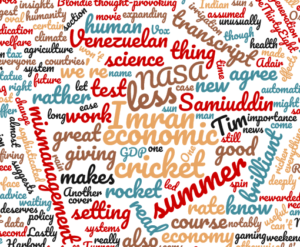Hi all,
Of course it happens. In a summer where we’ve had roughly 25% of the average rainfall a British summer is used to, all the rain we’re due has been concentrated on a small oval of land in Marylebone, thereby completely ruining the largest congregation of offensive jackets and catatonic elderly men in the UK: the marquee Lord’s summer test. We’ve had about 20 deliveries and a comical run-out and it continues to chuck down at a rate that makes my prediction of a drawn test less brave by the second. Honestly. Any country suffering a drought should just organise a cricket match and invite me. Guaranteed thunderstorms.
- While we’re on the subject of cricket, let’s ease into development slowly with this phenomenal profile of Pakistan’s new Prime Minister, Imran Khan, by Osman Samiuddin. Samiuddin is one of the best writers I’ve come across, and this in-depth study of Imran is essential for those of us who only know him for his run-up and cornered tigers speech. He builds from cricket to politics, drawing the threads of the various personas Imran has presented to the public, and their drawbacks – ones which matter rather more for a politician than a cricketer. More concretely, CGD have also put together a quick economic cheat sheet for the new PM, setting out the key challenges he faces.
- Did you know that in Caracas it is considered an act of terrorism to calculate the true exchange rate between the Venezuelan Bolivar and the US Dollar? Here’s the thing about catastrophic economic mismanagement: it quickly spirals. Venezuela is a great example of this. Economic mismanagement and the unwillingness of the state to admit to failure and reverse course have immiserated a large chunk of the population, while simultaneously giving those with connections the opportunity to make a vast amount of money off the back of this misery. Planet Money’s investigation into the political economy of Venezuelan currency controls is brilliant and rather harrowing when you think about it (transcript).
- This week in research that goes entirely against my priors: apparently hospital waiting time targets have led to health improvements. I had assumed they rewarded the most sophisticated gaming of the system, and this might still be the case, but this paper certainly suggests otherwise.
- Arvind Subramanian and co on the potentially devastating effects of climate change on Indian agriculture. What makes this such a good read is the unusually good section setting out policy implications, notably the importance of expanding irrigation systems.
- Another brilliant long read: Adair Turner on automation and the future of work and the economy (transcript). It is deeply thought-provoking, though you won’t agree with everything in it. One thing I really do agree with: GDP is, for richer countries, less and less useful as an indication of human welfare. It also prompted a discussion among friends of whether or not he has the right spin on William Baumol’s cost disease work, giving me the chance to link to this excellent piece by Dietrich Vollrath again.
- Tim Harford on the quiet methodological revolutions powering the next generation of economic insights. Tim has made an article about economists using tax data interesting and non-techy. The man deserves a statue.
- Lastly, in news that seems almost certain to culminate in a movie starring The Rock, NASA is apparently firing a rocket into the sun in the name of science and human safety. Vox cover the mission here, and FiveThirtyEight some of the science underlying it here. I can’t offer any scientific advice to NASA, but I do have this: if at the moment this rocket reaches the sun’s surface, the soundsystem is playing anything other than 11:59 by Blondie, they will have let humanity down.
Have a great weekend, everyone!
R

